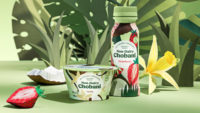One of the main trends witnessed at this year’s Natural Products Expo West – the world’s largest natural, organic and healthy products event with over 80,000 attendees across various vertical markets – was the different SKU variations of products and flexible packaging options offered within the same brand. According to “The Future of Flexible Packaging to 2022” report conducted by Smithers Pira, the flexible packaging market is projected to grow at an annual rate of 4.3 percent, reaching a total value of $283 billion in 2022. The variety of flexible packaging showcased on the show floor is proof that this growing segment in the packaging industry presents new and exciting opportunities for the adoption of emerging label and packaging technologies and solutions, such as digital printing presses.
It’s no surprise that contract manufacturers and label converters are making the transition to go fully digital to help reduce costs, increase sustainability and create flexible packaging with quicker turnarounds to meet the needs of brand companies competing to stand out from a busy market – including verticals in the food, beverage, health and beauty markets.
The following are benefits driving co-packers and vertical label manufacturers to create flexible packaging using digital printing:
Short-Run, Customized Packaging
Traditionally printed on flexo presses, flexible packaging generally involves medium to large runs. As digital printing continues to gain popularity in the flexible packaging segment, the option to print short-run flexible packaging is appealing to co-packers and vertical label manufacturers. The capability to handle short runs for a variety of different designs or SKUs helps to decrease costs associated with the elimination of plates and pre-processes.
This trend requires co-packers and label manufacturers to meet the increasing demand for customization in flexible packaging, making it easier to adapt to digital printing to help brands tailor their marketing messages, offer a vast range of sizes of the same product and meet government regulations across various industries.
Ability to Handle Versatile Substrates
Flexible packaging is far more complex than simply printing labels and placing it on a container or package. For example, there are many factors that need to be considered for companies creating flexible packaging for coffee. Factors include shelf life expectancy, desired humidity level and the temperature the coffee will be stored in. Packaging engineers can typically guide and provide recommendations of which substrates to use, but it is the type of printing equipment being used, and its capability to print on various substrates that help with creating flexible packaging for the coffee producer.
Although digital printing presses are more expensive than traditional options, they offer the capability to print on several different kinds of substrates, including thin films. Many digital label presses offer versatile substrate support and include processing improvements for variable data processing (VDP), as well as support for thin films, metallic and laminated pouch materials.
Color Accuracy
One of the most important features that digital printing offers is color accuracy. Accurate color in flexible packaging labels is essential for brands to stand out in the crowd of consumer goods. Heavy use of photographic images and brand colors demand a wide color range and imply quality to the end consumer.
Many flexible packaging applications require white ink to print on clear and metallic pouches which are often used for food products. Many digital printing manufacturers have developed specific ink technologies to ensure that government regulations and guidelines are met and do not negatively impact the food products, helping co-packers and vertical label manufacturers meet compliance.
As the flexible packaging segment continues to grow – whether it is to adapt to changes in this market segment or to meet the needs of different SKU proliferations and packaging – digital printing adoption is the next step when it comes to meeting and producing high-quality flexible packaging.

